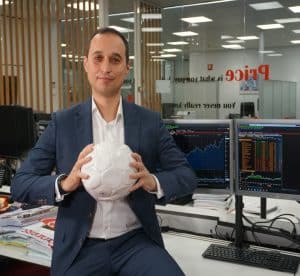Luis García (MAPFRE AM): “The market is ignoring soccer's ‘value’ characteristics”

Redacción Mapfre
ELECONOMISTA interview with Luis García, manager of the MAPFRE AM Behavioral Fund
Passionate about sports and their evolution in the markets, Luis García, manager of the MAPFRE AM Behavioral Fund, offers his didactic view on the performance of soccer teams on the trading floor and the outlook for Barça Studios’ potential debut in Spain.

What are the advantages of a soccer club going public?
The main goal of an IPO is to finance growth. Companies reach a point where they need to either grow or—as in the case of Barça—refinance debts (or a mixture of both) and they have to decide how to do it: with more debt or through private investors. The problem is when such large amounts of money are needed, it's difficult for a single investor to do it. One attractive way to gain access to a huge market of investors is the stock market. Your range of potential investors opens up a lot, and there are other advantages as well, such as the liquidity it gives to the shares and transparency: listed companies have to provide income statements every three months with their reports, and the supervisor reviews their accounts and activities.
With soccer clubs going public, is there a risk of confusing passion with investment?
Yes, we need to do a lot more educating. That is what we're doing. The market for shares in listed soccer clubs is one of the most inefficient markets I know of. In my opinion, there are times when there are tremendous differences between what the market says a company is worth and what it’s really worth and then there are many reactions that make no economic sense. In the market in general there are usually many short-term overreactions to negative news and underreactions to positive news, but in the world of soccer the inefficiencies are greater, which, in our view, is an opportunity because the market may be inefficient for a while, but sooner or later this trend will be corrected.
Of the listed clubs now, in which ones do you take positions?
At Borussia Dortmund, which is where we have the largest position in the fund, and at Ajax Amsterdam, another club where we believe there are major inefficiencies. They sold several players in the summer transfer market for many millions and this hasn't yet been reflected in their stock price and has had a very big impact. Both meet the requirements we demand of the other companies in the fund: they're a good business, they have a healthy balance sheet and they have a good management team with a track record of value creation. Borussia, in fact, recently reported results and have already recovered from the impact of the pandemic and are already generating cash and are expected to pay dividends next year.
I heard him say, “There's nothing more ‘value’ than soccer.”
Normally value investors try to look for turnaround stories where there's a fundamental value that’s going unnoticed by the market, and that’s what’s been happening in recent years in the world of soccer. Moreover, the characteristics of soccer as a product are very valuable, because there's stability in supply (new soccer clubs with millions of fans don’t just come out of nowhere) and in demand (the consumer is very, very loyal). And I believe that market inefficiencies won't last forever.
How do you link ESG to soccer investment?
There's nothing better ESG to invest in than sports. It’s the main driver of social change. We're seeing it now (in clear reference to the departure of Rubiales from the RFEF) and we've seen it on other occasions such as when in South Africa rugby was used to try to put an end to the separation of races in the country. It's the biggest driver of social change and a very important industry from an environmental point of view, because it consumes an amount of energy that could have a very significant impact if managed efficiently. And then investment in soccer as we're tackling it is a story of changes in the corporate governance of clubs, which previously weren’t managed to create shareholder value and now there are a few that are beginning to be. It's a story that should appeal to ESG investors.
The big European leagues have at least one club already listed on the stock exchange, so what's missing in Spain?
It’s the only one of the major leagues in which no club is listed on the stock exchange. In fact, there are several leagues in which at some point there was more than one. It’s an anomaly, because at the end of the day, there are financing needs in every country. Now, in fact, there are two clubs doing a capital increase and one option could have been to go public, so why is nobody doing it? There is probably a lack of financial disclosure and explanation of the consequences of an IPO. Nobody wants to be the first, or receive backlash from the fans... Because I’m sure whoever is the first isn't going to have it easy, but if there's someone with financing needs, it’s usually cheaper to finance in the stock market.
CouldmBarça Studios’ IPO pave the way for other teams to debut on the stock exchange?
Yes, it could, in regard to it being news that generates an impact and the fact that there are clubs that might consider it, but it’s important to emphasize that it’s not Barça that's going public, but rather certain divisions of the club. There's still a lack of information because there are business areas as different as merchandising, the content production company, the academies and the innovation hub, all of them businesses that are nothing alike and we don't know the weight in terms of revenue of each of them. To adapt that to a soccer club is very difficult. With the information we have, the part of Barça that would be listed cannot be compared to any soccer club because it doesn't seem to have the same dynamics.
What valuation could Barça or Madrid as a club have on the stock market if they decided to go public?
It’s very complicated, you have to study their accounts very well and in depth. A lot of things have to happen before a stock market fund decides to invest in a soccer club. There are many things that come into play. Even the market doesn't give you much information. What has been paid for Chelsea (Todd Boehly closed the purchase at more than 5 billion euros) would certainly be paid for Madrid or Barcelona, but to arrive at a valuation, the multiples of the listed companies don’t give you much information either. It’s not a simple question. And in the case of Barça Studios specifically, the additional difficulty is that it can't be compared to a soccer club per se, because it’s trying to go public with a part of the team that has nothing to do with the three main sources of income for clubs, which are basically television rights, player transfers and the box office.



